- Home
- Anne Stuart
The Spinster and the Rake Page 15
The Spinster and the Rake Read online
Page 15
“Bertie? He’s somewhere about, moping, no doubt. What has that got to do with your outrageous behavior, Gillian?” Derwent demanded.
“I am disturbed about him, Derwent,” she confessed.
“And I am disturbed about you! Bertie has been a model of propriety, despite his fatal addiction to gaming, compared to you, miss!” He continued on in that vein for a bit, while Gillian, with a look of dutiful and contrite attention, busily pursued her own thoughts.
Doubtless it was the gaming that had given Bertie that desperate, haggard expression. And not the gaming per se, but the debts that losing incurred. She had little doubt that if luck had smiled upon him he would have continued his normally sunny-tempered self.
He had refused to confide in her, and it was idiotically unfair. She had more than enough money to assist him. Indeed, her personal fortune was a great deal more than genteel, it was positively vulgar, and she had nothing to do with it but spend it on her family. If only he weren’t so mutton-headed as to refuse her assistance. And how to offer it if she had no idea of the extent of his losses?
Her eyes lit upon Marlowe’s figure across the room Except for his one dance with the ravishing young lady who had turned out to be his second cousin (Felicity had roused herself from her love-struck daze to impart that information to a determinedly casual Gillian), he had remained on the sidelines, his attention apparently absorbed in conversation, except for the occasional mocking glances he would send in her direction whenever he felt her eyes upon him. Which was far too often.
The question was, Gilly thought, moving away from the fulminating Derwent and seating herself by the French doors, how to manage a few words with him? He would know better than anyone the extent of Bertie’s debts, or if he was unaware of their full extent, he could certainly find out for her. If only she had thought of it earlier. She had already danced her allotted two dances with him. To dance a third dance with a gentleman was unthinkable, even if one were approached by a gentleman who so forgot himself as to ask. Better to ride stark naked down St. James’s Street like a latter-day Lady Godiva than dance three times with a gentleman unrelated to one. There was little she could do that would put her more completely beyond the pale, and even a rakeshame such as Ronan Marlowe would never sink to such a level as to ask her for a third time.
A tall shadow moved in front of her, and she raised her head to meet Marlowe’s cool expression. “It is another waltz, Gilly,” he observed coolly. “I think I must ask you to dance with me.”
She drew in her breath sharply. “We’ve already danced twice.”
“I have not consumed so much brandy that I am unaware of that fact. Indeed, I doubt I would ever forget how many times I have held you in my arms. Will you dance with me?”
“I cannot!” She looked up at him pleadingly. “Indeed, had something of a particular nature to ask you. About Bertie. Could you perhaps procure me a glass of orgeat and we could sit here and discuss it?”
No answering smile lit the dark planes of his face. “As a gentleman I should of course acquiesce. But I am rag-mannered at best, and I wish to dance.”
“Then find another partner,” she said desperately, her large eyes miserable.
“I don’t wish another partner. I wish to dance with you. Have you become so cow-hearted recently? To be terrorized by an idiotish society?”
“There are certain rules of polite behavior . . .”
“Rubbish! I hadn’t thought so poorly of you, Miss Redfern.” No longer Gilly, she noted mournfully, and his eyes were stern.
“I am afraid I must refuse your kind offer, my lord,” she said with as much dignity as she could muster.
“You disappoint me greatly, Miss Redfern. And not just in the matter of the dance. I hadn’t noticed a resemblance between you and your brother until tonight.” He turned to leave her, his head averted so she couldn’t see the amusement in his dark eyes.
“I am not like my brother!” she cried, outraged. He turned back, and his face was expressionless.
“Then dance with me. Show these gossiping old tabbies how little you care for their silly little rules, and I will tell you everything you wish to know about your green nephew.” There was a teasing note in his voice that she couldn’t miss, one that should have stiffened her resolve. Instead it melted it completely.
She held out her hand to him, hearing Letty’s outraged gasp behind her. “You, my lord, are a devil,” she said roundly as she followed him out on the dance floor. Every eye in the Belvoirs’ flower-bedecked ballroom was upon them, and whispers nearly drowned out the strains of the waltz as he drew her into his arms, a little closer this time.
“And you, my love, are a blue-eyed witch,” he whispered, and swung her into the dance.
Chapter Sixteen
“THERE CERTAINLY was a rare dust-up tonight,” Bertie offered as he escorted his shameless aunt up the broad front steps of the Berkeley Square mansion. “Did you really dance with Lord Marlowe three times?”
“I did,” Gilly confirmed. “And if Derwent hadn’t threatened to create a scene I doubtless would have danced with him a fourth or even fifth time.”
“But he hasn’t . . . that is to say, he didn’t . . . ?” Bertie floundered. “You aren’t going to . . . ?”
“I’m not going to what?” Gilly encouraged him, still turning over the sum Marlowe had whispered in her ear. Nine thousand pounds was a very great deal of money to owe, to be sure. But not worth Bertie’s complete misery.
“Well, when people dance together more than twice in one evening it usually signifies that they have come to some sort of understanding.” Bertie brought it out finally.
“We have. We understand each other, Lord Marlowe and I, and we have agreed to be friends. Nothing more.”
“Well, no wonder Uncle Derwent was furious!” Bertie said, much impressed. “You certainly have become brave in the last few weeks, Gilly. I remember a time when you would be in an absolute quake over what Uncle Derwent would have to say about the most minor peccadilloes. And now you commit a major breach of conduct and don’t even turn a hair.”
“It’s scarcely worth all the bother,” she said as she handed her cape to a curious Truffles.
“If you say so,” her companion said negligently. “If you’ll excuse me, Gilly, I think I’ll—”
“I most certainly won’t excuse you!” She caught his arm. “I am far too wound up to sleep right now, and I need some company. Indulge your poor aunt in a glass of claret and a hand or two of piquet.”
“I don’t really feel like gambling,” Bertie said somberly.
“I rejoice to hear it. I have little doubt you’ve spent far too much time in that occupation than is good for you. However, gaming at Lord Marlowe’s salon and keeping me company are two very different things. I’ll get the cards while you have Truffles bring us some of Derwent’s best claret and meet me in the upstairs sitting room. I don’t expect we’ll see the rest of them for several hours yet, and I mean to keep awake long enough to ring a peal over Derwent for bundling me off in such a high-handed manner.”
It didn’t take her long to arrange the furniture to her satisfaction in the small, cozy salon that usually served the female members of the Redfern family. Truffles stoked up the fire, taking the damp chill off the lofty proportions, and Gillian had him place the baize-covered gaming table in the strategic location she had already discovered earlier. A chair was placed opposite her for her hapless nephew, directly in front of the gilt mirror. The moment he picked up his first hand and settled back Gillian found the reflection in the mirror, and she smiled, well-satisfied with her machinations.
It was not that Bertie was such a good card player. As a matter of fact, his talent at cards was so execrable that Gilly couldn’t rely on her skill alone to achieve her aims. Without the aid of the mirror she could play her absol
ute worst and still Bertie might manage to lose.
“A pound a point, Bertie?” she inquired in dulcet tones, shuffling the cards with a practiced hand.
Bertie took a sip from his claret, not his first glass of the evening by any means, and nodded. “Whatever you say, Auntie,” he agreed in a lighthearted manner that convinced Gilly he thought she was simply funning. He would soon find out otherwise.
Bertie’s first few hands were played with a throwaway air, as if humoring an elderly relative. As he began to win, however, his attention sharpened, and it took all of Gilly’s skill to avoid the obvious mistakes that riddled his playing. If he always played so badly it was no wonder he was in debt. The only wonder was that he didn’t owe more.
Marlowe had looked down at her in amused surprise when she had made her request during their final, shameless waltz. “How much does your nephew owe? What a very odd question, Gilly-flower, to be sure.”
“He is terribly worried about his debts, my lord, and I wish to help him,” she said earnestly, fighting the temptation to snuggle closer to him as he whirled her around the dance floor.
“And you think I am likely to dun him? A fine opinion you have of me, I must say.”
“You think Bertie is likely to shab off?” she countered. “A fine opinion you have of my family, my lord.”
“I have no intention of telling you anything unless you desist with that stuffy ‘my lord.’ Sounds like my old nurse when she’s angry with me.”
“Ronan, would you please find out how much Bertie owes around town?” she questioned sweetly, then ruined the effect by adding, “There, does that suit you?”
“Admirably. And I happen to know exactly how much the hapless Mr. Talmadge owes. Vivian brought up the matter a few days ago.” A troubled expression briefly shadowed his eyes. “Nine thousand pounds, and he owes it to me.”
Gillian sustained the shock admirably. “A large sum,” she remarked, “but not quite as great as I feared. But are you certain? He frequented other gaming hells before yours.”
“I believe he had a run of luck just before Vivian brought him to St. James’s Street. It must have been extraordinary, for I don’t hesitate to tell you, my dear Gillian, that he plays abominably badly.”
“You haven’t been asking him for the money, have you?” she inquired anxiously.
“If I weren’t madly in love with you, Gilly,” he said in a mocking tone of voice, “I would pour champagne on your head for that question.”
She shouldn’t refine on that remark too much, she told herself as she sat across from Bertie. Marlowe had been teasing her, as he always did.
She was distracted enough to accidentally win that hand, and Bertie’s face fell.
“I should have known the dibs would never stay in tune,” he mourned. “It happens this way every time—I have a short run of luck and then it peters out. Peacock always tells me my luck will change, but it never seems to.”
“Well, you’re already fifteen hundred pounds ahead of me, Bertie,” Gillian pointed out. “And the night is still young. I don’t see what you have to complain about.”
“Fifteen hundred pounds,” Bertie giggled, good humor restored. “Ha, ha. That’s good, Gilly.”
“Good indeed,” she said serenely, and dealt the next hand.
He ended up by winning nine thousand, six hundred pounds, Gillian having decided that he needed a new hack and doubting his purse-pinched father would stand the ready. The last of the claret was gone, and Gilly leaned back in the comfortable chair, well pleased with her night’s work.
“I’ll tell you something, Gilly,” Bertie confided owlishly as he drained his glass. “I don’t think I really care for gaming all that much.”
“Don’t you? I am relieved to hear it. It certainly isn’t a very comfortable addiction.”
“As I was winning all I could think of was why it should matter. Tell you what, I don’t think I really have the brain power for it.”
Gilly smiled. “I think everyone flies a great deal too high for you in London. If you care to gamble with a few friends for small stakes on occasion, I see nothing wrong with it, but it truly is a fatal addiction.” She covered her mouth with one slim hand as she yawned daintily. “I’ll give you a draft on my bank tomorrow, Bertie. For the money I owe you.”
He stared at her, momentarily sobered. “What money?”
“The nine thousand, six hundred pounds I just lost to you,” she replied demurely.
“Don’t be absurd!” Bertie cried. “I thought you were in jest. I hadn’t realized we were really playing for that sum of money!”
“Hadn’t you? Then it is fortunate that you are the more expert player,” she said mendaciously.
“But I can’t accept the money from you. It just isn’t done!”
“Bertie”—Gilly’s voice was stern—”are you telling me that you refuse to allow me to discharge a debt of honor? How dare you suggest that I have less scruples than the most ramshackle gentleman.”
“No, I didn’t mean to say that, Gilly,” he replied desperately. “But can’t you see, I cannot accept all that money from you.”
“No, you can’t accept it,” she agreed. “Not as a gift. But you can and must accept your winnings. You beat me fairly, and I will pay you. After all, I was the one who set the stakes.”
“But you cannot afford it!”
Gillian smiled. “Don’t be absurd. I would never play for more than I could afford to lose. Ninety-six hundred pounds will never be noticed. My money merely sits in the bank and makes more money. Derwent refuses to allow me to spend any on my upkeep, so I have to fritter it away on gewgaws and gaming and various other profligacies.”
A faint ray of hope was forming in the back of Bertie’s usually desperate eyes. “Gilly,” he breathed, “must I accept the money?”
“You must.”
He let out a long, shaky breath. “Very well, if you insist,” he said finally. “I know just what I’ll do with it, too.”
“More gaming, Bertie?” she inquired, holding her breath.
He shook his head. “Absolutely not. Better to end my gambling career in a blaze of glory. I have, a few trifling debts”—here he had the grace to blush—”to discharge, and then I think I might possibly buy a new horse. That is, if you approve?” he added anxiously.
“It is your money, my boy, won fairly,” she replied. “You may do with it as you please. Though I must say such a program sounds admirable.”
“And, Gilly,” Bertie added hesitantly, “you really ought to be careful.”
“How do you mean?” she returned warily, expecting a homily on the dangers of Lord Marlowe.
“You shouldn’t play for such high stakes when you play so very badly. If you like I might give you a few pointers on piquet sometime,” he offered in a kindly tone.
Gillian kept a straight face with a great deal of effort. “That is sweet of you, Bertie, but I think I might follow your lead. Gaming seems far more trouble than the momentary thrill it offers. I would—did you hear something?” Voices were reaching Gilly’s sharp ears from the front hallway.
“They must have returned.”
“Then I’m off to bed. I suddenly feel quite unable to face Derwent in all his disapproving glory this evening. Meet me tomorrow in the breakfast room at eleven, and I’ll give you a draft.”
“Are you quite certain . . . ?”
“Bertie, the more you protest the more you offend me,” she warned, heading for the door.
“I wouldn’t want to offend you for the world, best of all my aunts,” Bertie swore, and then leaned back in his chair, a seraphic expression on his face, as Gilly happily stole off to bed.
Chapter Seventeen
GILLIAN SPENT A languorous morning. She rose quite late, as was to be expected
from a lady who retired a few minutes before daybreak. She had a solitary breakfast in her small, elegant room at Berkeley Square consisting of croissants, fresh fruit, and coffee, a Gallic fest the rest of the family highly disapproved of. That morning she was in no mood to listen to their everlasting criticism.
An hour at her small, papier-mâché desk was similarly felicitous. Several missives of a nature that would have startled the majority of the Redfern family were penned, along with a bank draft for nine thousand six hundred pounds for Bertie. And there was money well spent, she thought, pushing away from the desk with a satisfied smile and stripping off her frilly lawn dressing gown. Ninety-six hundred pounds in return for a sweet-natured young man who had faced temptation and would no longer be captured by it was a bargain at the price. She had no doubt that Bertie would be able to resist the lure of gaming from then on. And his friends, young Porter and Willie Meekham were far more addicted to sport than the lure of the dice. No, he would be fine.
And so would Felicity, she thought, dressing slowly in a round gown of soft rose wool. Her happiness fairly seemed to permeate the darkest corners of the Redfern house, and even Derwent had been seen to smile on occasion last evening, before Gillian had fallen from grace with such a resounding thud. Now it only remained, she thought wistfully, to manage her own life as well as Felicity had.
“Miss!” Flossie exclaimed from the doorway. “You’ve gone and dressed yourself, and without even calling me.”
“I wanted to be alone, Flossie,” she replied distantly, strolling toward the windows that overlooked the square, one hand twirling a tawny lock lazily. “I am certain you have been busy enough.”
“Yes, miss. Would you like me to fix your hair?”
“No, don’t bother,” she said, peering with her excellent eyesight at the passersby down below on the street. “I don’t intend to do much more than read today, and I don’t require anything . . .” Her eyes narrowed, and her voice trailed off as a familiar figure strolled into view. She waited one more moment to make certain the Redfern house was his destination, and then flew to the dressing table. “Don’t just stand there, Flossie,” she cried. “Help me with my hair.”

 Ice Blue
Ice Blue Seen and Not Heard
Seen and Not Heard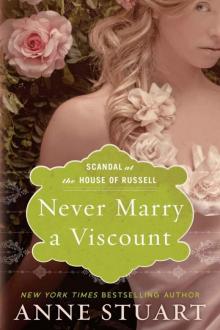 Never Marry a Viscount
Never Marry a Viscount Heartless
Heartless The Devil's Waltz
The Devil's Waltz Hidden Honor
Hidden Honor Silver Falls
Silver Falls Fire and Ice
Fire and Ice Nightfall
Nightfall Never Trust a Pirate
Never Trust a Pirate The Soldier and the Baby
The Soldier and the Baby Still Lake
Still Lake Reckless
Reckless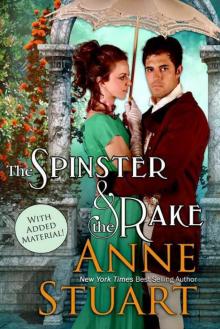 The Spinster and the Rake
The Spinster and the Rake Winter's Edge
Winter's Edge At the Edge of the Sun
At the Edge of the Sun Into the Fire
Into the Fire Night of the Phantom
Night of the Phantom Ritual Sins
Ritual Sins Darkness Before the Dawn
Darkness Before the Dawn Against the Wind
Against the Wind Ruthless
Ruthless The Catspaw Collection
The Catspaw Collection Escape Out of Darkness
Escape Out of Darkness The Widow
The Widow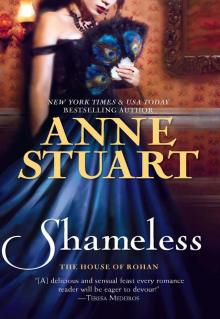 Shameless
Shameless Black Ice
Black Ice Breathless
Breathless Shadows at Sunset
Shadows at Sunset Falling Angel
Falling Angel Housebound
Housebound Cold as Ice
Cold as Ice The Wicked House of Rohan
The Wicked House of Rohan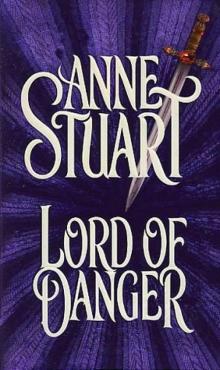 Lord of Danger
Lord of Danger The High Sheriff of Huntingdon
The High Sheriff of Huntingdon Wildfire
Wildfire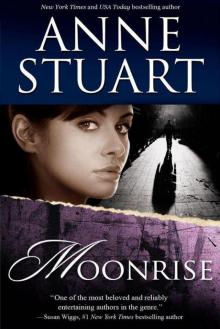 Moonrise
Moonrise The Demon Count's Daughter
The Demon Count's Daughter Date With a Devil
Date With a Devil To Love a Dark Lord
To Love a Dark Lord Driven by Fire
Driven by Fire Special Gifts
Special Gifts Ice Storm
Ice Storm Shadow Lover
Shadow Lover A Dark & Stormy Night
A Dark & Stormy Night Now You See Him...
Now You See Him...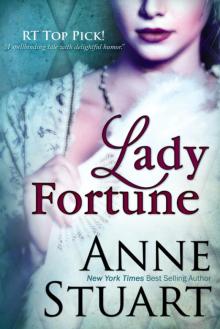 Lady Fortune
Lady Fortune Glass Houses
Glass Houses A Rose at Midnight
A Rose at Midnight Prince of Swords
Prince of Swords One More Valentine
One More Valentine Return to Christmas
Return to Christmas Tangled Lies
Tangled Lies Consumed by Fire
Consumed by Fire The Fall of Maggie Brown
The Fall of Maggie Brown Wild Thing
Wild Thing Crazy Like a Fox
Crazy Like a Fox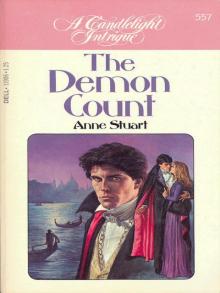 The Demon Count
The Demon Count Prince of Magic
Prince of Magic Wildfire (The Fire Series Book 3)
Wildfire (The Fire Series Book 3)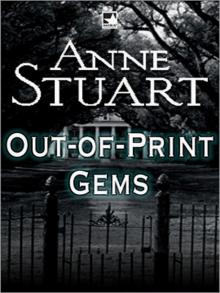 Anne Stuart's Out-of-Print Gems
Anne Stuart's Out-of-Print Gems Shadow Dance
Shadow Dance Under an Enchantment: A Novella
Under an Enchantment: A Novella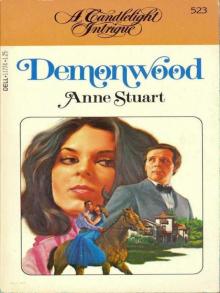 Demonwood
Demonwood Blue Sage (Anne Stuart's Greatest Hits Book 3)
Blue Sage (Anne Stuart's Greatest Hits Book 3) Barrett's Hill
Barrett's Hill Angel's Wings (Anne Stuart's Bad Boys Book 5)
Angel's Wings (Anne Stuart's Bad Boys Book 5) Darkness Before Dawn
Darkness Before Dawn The Right Man
The Right Man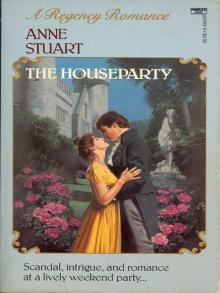 The Houseparty
The Houseparty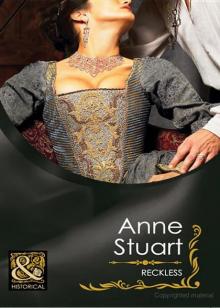 Reckless_Mills & Boon Historical
Reckless_Mills & Boon Historical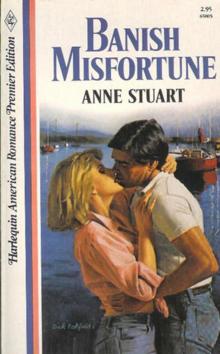 Banish Misfortune
Banish Misfortune Angel's Wings
Angel's Wings Chain of Love
Chain of Love Consumed by Fire (The Fire Series)
Consumed by Fire (The Fire Series) Partners in Crime (Anne Stuart's Bad Boys Book 4)
Partners in Crime (Anne Stuart's Bad Boys Book 4) The Soldier, The Nun and The Baby (Anne Stuart's Greatest Hits Book 2)
The Soldier, The Nun and The Baby (Anne Stuart's Greatest Hits Book 2)